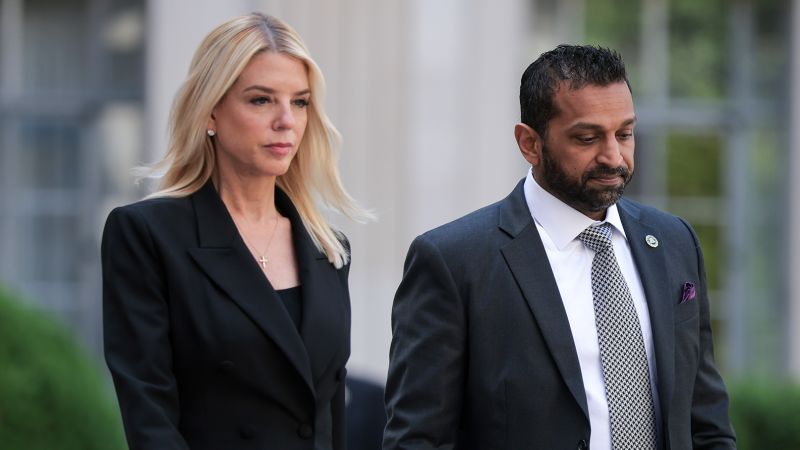On Wednesday night, a dinner gathering at the residence of Vice President JD Vance was initially planned to facilitate crucial discussions among key officials from the Trump administration regarding the highly publicized Jeffrey Epstein scandal. Ushering in the intention of rekindling relationships, the potential attendees included Attorney General Pam Bondi and FBI Director Kash Patel, who had reportedly found themselves entangled in a web of conflict surrounding their differing approaches to the handling of the Epstein case. The dinner was envisioned as a crucial opportunity for these officials to clear the air and develop a more unified strategy in response to the ongoing investigation.
However, on that very Wednesday afternoon, sources close to the administration expressed uncertainty about whether the dinner would proceed as initially intended. The disharmony amongst attendees regarding the infamous Epstein scandal had garnered relentless media attention, prompting concerns over the possibility of the dinner being either canceled, relocated, or rescheduled entirely. The situation remained fluid, with officials weighing their options amid the mounting pressure of media scrutiny and public interest.
The tension surrounding Bondi and Patel’s working relationship had come to light during a tense meeting at the White House last month. This encounter, which also involved Chief of Staff Susie Wiles, raised significant queries about the future of FBI Deputy Director Dan Bongino within the administration. The blowup generated ripples of discontent, leading Vice President Vance to intervene and among other efforts attempt to mediate tensions while balancing his responsibilities as a family man, actively engaging with officials while enjoying rides at Disneyland with his loved ones. Reports suggest that Vance’s influence had a notable effect, as Bongino resumed his duties shortly thereafter, though speculation remains regarding his long-term position with the administration amid the ongoing backlash from the Epstein scandal.
In anticipation of the Wednesday dinner, Vance was expected to once again step into the role of a peacemaker. Sources indicated that the gathering presented an ideal setting for the officials to approach their conflicts in an informal, low-stakes environment – allowing for potentially productive discussions. Not only was Bondi expected to join Patel, but Deputy Attorney General Todd Blanche would also be in attendance as the administration grappled with the decision of whether to release an audio recording and transcript from a recent conversation with Epstein’s accomplice, Ghislaine Maxwell.
The administration’s management of the Epstein case, alongside the need for a cohesive narrative moving forward, was highlighted as a prime focus of the dinner discussions. Despite denials from Vance’s office about any scheduled meeting regarding Epstein strategies, statements from his communications director, William Martin, insisted no such plans had ever been conceived, attributing misleading information to the press.
While officials were deliberating the fate of the dinner, there remained a possibility that the gathering could proceed, albeit possibly at an alternate location, and discussions might extend beyond just the Epstein case. Several officials saw this as an opportune moment for a reset following Patel’s overseas engagements, where he had spent weeks opening field offices in locations like New Zealand and Australia. It was believed that this meeting could contribute to realigning the narrative surrounding the Epstein case, which had seen the White House on the defensive in recent weeks.
Months before the Justice Department’s release of a memo concerning the Epstein case—contradicting several conspiracy theories that pervaded discussions on the subject—an atmosphere of unease began to develop covertly between the FBI and the Justice Department. Sources reported that tensions amplified when FBI officials felt that Bondi was dedicating too much attention to media appearances discussing Epstein’s files rather than engaging with the materials delivered to her office by the FBI.
Following these developments, further complications emerged when Bondi indicated that a so-called client list connected to Epstein was present on her desk during a media interview—despite previous determinations that such a list would not be made publicly available. The subsequent release of the memo contradicted many of the conspiracy narratives circulating within far-right factions, leaving Patel and Bongino facing backlash from the more extreme elements of the MAGA base who had anticipated transparent revelations surrounding Epstein’s associates.
A notable incident of conflict erupted during last month’s White House meeting between Bondi, Patel, and Bongino, where accusations regarding leaked negative information aimed at Bondi surfaced. As tensions flared, Bongino vehemently denied these allegations before making a dramatic exit from the meeting, voicing to Patel and others his uncertainty about returning to his position amid ongoing controversies. This situation captured the dilemmas faced by the administration as it navigated the complexities of the Epstein scandal, highlighting the internal divisions and the urgent need for a cogent strategy moving forward.











